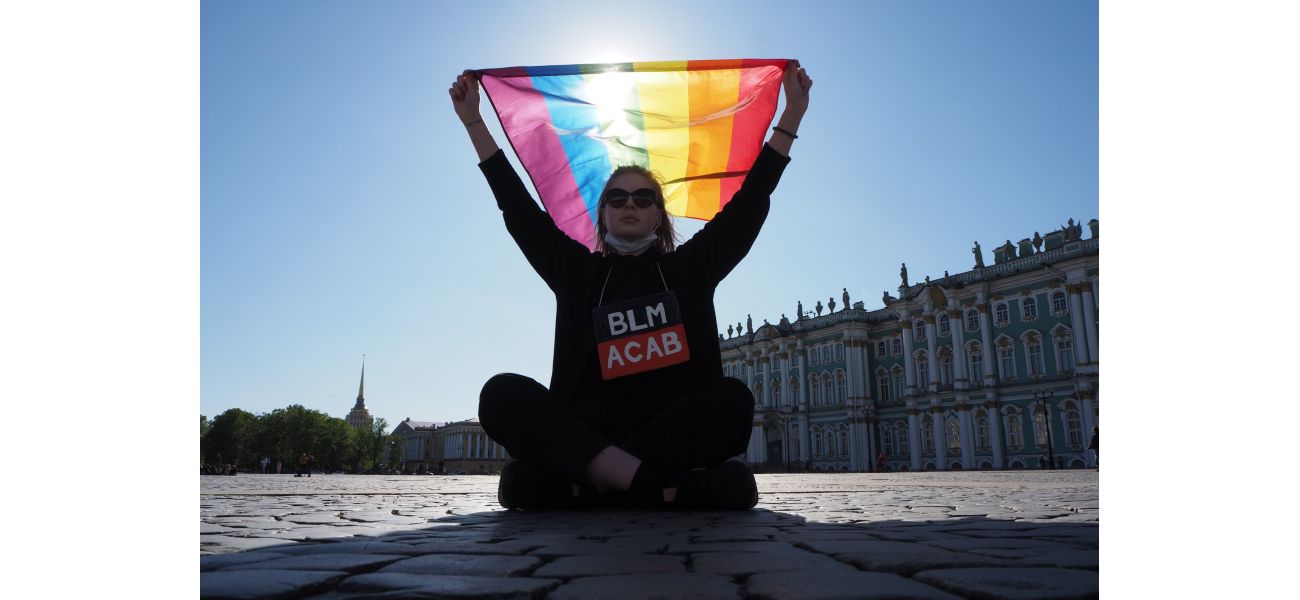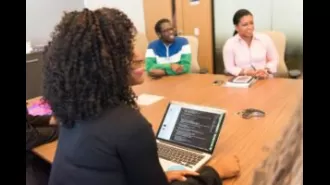LGBTQ+ Russians successfully oppose being labeled as "perverts to be crushed by tanks."
According to a high-ranking Russian representative, LGBTQ+ activists are heavily impacted by AIDS.
December 4th 2024.

The LGBTQ+ community in Russia has long been silenced by the country's controversial "gay propaganda" law. But recently, a group of LGBTQ+ Russians finally found their voices and fought back against discrimination and homophobia.
Aleksey Yevstifeyev, Ruslan Miniakhmetov, and Daniil Grachev, three brave activists, took their case to the European Court of Human Rights. They alleged that Moscow did nothing to protect them from the rampant homophobia in their country. And their claims were not unfounded - during a May Day rally in St. Petersburg, a well-known politician hurled a barrage of homophobic insults at them.
Among the insults were derogatory terms such as "perverts", "scumbags", "Aids-ridden", and "paedophiles". The politician even went as far as to say that the trio should be "liquidated" and "crushed with tanks and tractors". It was a horrifying and traumatizing experience for Aleksey, Ruslan, and Daniil.
Finally, after years of fighting for justice, the European Court of Human Rights ruled unanimously in favor of the LGBTQ+ activists. The court found that Russia had violated their right to a private life and to live free from discrimination. As a result, the three claimants were awarded €7,500 each.
The incident that sparked this legal battle took place on May 1, 2015. Aleksey, Ruslan, and Daniil joined around 600 others in a LGBTQ+ column at a protest during International Workers' Day. But instead of being able to peacefully express themselves, they were met with hate and violence from a deputy of Russia's lower house of parliament, Vitaly Milonov.
Milonov used vulgar and offensive language to attack the LGBTQ+ demonstrators, even going as far as to say that he knew half of them were paedophiles. His words were not only hateful, but also incited violence towards the activists. Milonov even urged the police to arrest them.
Despite their efforts to seek justice in Russian courts, Aleksey, Ruslan, and Daniil were repeatedly told that Milonov was simply expressing his opinion and that the police were only trying to arrest Daniil. But the European Court of Human Rights saw through this excuse and recognized the impact that Milonov's words had on the psychological well-being and dignity of the three activists.
Although Russia does have anti-discrimination laws in place, the court was not convinced that they were effectively enforced. In fact, they believed that the authorities had failed the LGBTQ+ victims in this case. The court also noted that the domestic authorities provided no valid reasons for rejecting the complaint of discrimination and minor disorderly acts.
For the LGBTQ+ community in Russia, this ruling is a small but significant step towards change. It serves as a reminder that the Kremlin is turning a blind eye to the hate and violence faced by the LGBTQ+ community. While it may not bring immediate change, this decision will set an important precedent for future cases in Russia.
In Russia, there is a law known as the 'gay propaganda' law that has been used to silence the LGBTQ+ community for quite some time now. Recently, a group of LGBTQ+ Russians, who were harshly described as 'Aids-riddled perverts', have won a case in the European Court of Human Rights. The three individuals, Aleksey Yevstifeyev, Ruslan Miniakhmetov, and Daniil Grachev, claimed that the government did not do enough to protect them from homophobia.
According to the claimants, during a May Day rally in St Petersburg in 2015, a well-known politician hurled a barrage of homophobic insults at them, calling them 'perverts', 'scumbags', 'Aids-ridden', and even 'paedophiles'. The politician even went as far as saying that they should be 'liquidated' and 'crushed with tanks and tractors'. This kind of hateful behavior towards the LGBTQ+ community is unacceptable and should not be tolerated.
The three activists, Aleksey, Ruslan, and Daniil, all filed individual applications to the European Court of Human Rights in 2017. The court unanimously ruled in their favor, stating that Russia violated Articles eight and 14 of the European Convention on Human Rights, which guarantees the right to a private life and protection against discrimination. As a result, Russia will have to compensate the three claimants with €7,500.
On May 1, 2015, during a protest to celebrate International Workers' Day, Aleksey, Ruslan, and Daniil joined around 600 others in a defiant demonstration, carrying LGBTQ+ Pride flags and banners. Despite the presence of over 90,000 people, they stood out and made their voices heard. This is just one example of the bravery and resilience of the LGBTQ+ community in Russia.
It is important to note that the LGBTQ+ community in Russia still faces discrimination and hatred on a regular basis. During the May Day rally, Vitaly Milonov, a deputy of Russia's lower house of parliament, hurled vulgar insults at the LGBTQ+ demonstrators, referring to them with derogatory terms used in prison. He even went so far as to say that they should be thrown into the river, arrested, and jailed for five years. This kind of violent rhetoric and behavior towards the LGBTQ+ community is unacceptable and must be condemned.
Despite having anti-discrimination laws in place, the European Court of Human Rights expressed doubts about the effectiveness of their enforcement in Russia. They also found that the Russian authorities failed to take the claims of discrimination and disorderly acts seriously. This ruling serves as a reminder that the government is not doing enough to protect the LGBTQ+ community and is even encouraging and turning a blind eye to hate and violence towards them.
As a result of this ruling, Russian officials must take the necessary steps to address and prevent discrimination and violence towards the LGBTQ+ community. While this may not change things immediately, it sets an important precedent for future cases and serves as a reminder that such behavior will not be tolerated. It is time for Russia to recognize and protect the rights of the LGBTQ+ community and to put an end to the hate and discrimination they face.
Aleksey Yevstifeyev, Ruslan Miniakhmetov, and Daniil Grachev, three brave activists, took their case to the European Court of Human Rights. They alleged that Moscow did nothing to protect them from the rampant homophobia in their country. And their claims were not unfounded - during a May Day rally in St. Petersburg, a well-known politician hurled a barrage of homophobic insults at them.
Among the insults were derogatory terms such as "perverts", "scumbags", "Aids-ridden", and "paedophiles". The politician even went as far as to say that the trio should be "liquidated" and "crushed with tanks and tractors". It was a horrifying and traumatizing experience for Aleksey, Ruslan, and Daniil.
Finally, after years of fighting for justice, the European Court of Human Rights ruled unanimously in favor of the LGBTQ+ activists. The court found that Russia had violated their right to a private life and to live free from discrimination. As a result, the three claimants were awarded €7,500 each.
The incident that sparked this legal battle took place on May 1, 2015. Aleksey, Ruslan, and Daniil joined around 600 others in a LGBTQ+ column at a protest during International Workers' Day. But instead of being able to peacefully express themselves, they were met with hate and violence from a deputy of Russia's lower house of parliament, Vitaly Milonov.
Milonov used vulgar and offensive language to attack the LGBTQ+ demonstrators, even going as far as to say that he knew half of them were paedophiles. His words were not only hateful, but also incited violence towards the activists. Milonov even urged the police to arrest them.
Despite their efforts to seek justice in Russian courts, Aleksey, Ruslan, and Daniil were repeatedly told that Milonov was simply expressing his opinion and that the police were only trying to arrest Daniil. But the European Court of Human Rights saw through this excuse and recognized the impact that Milonov's words had on the psychological well-being and dignity of the three activists.
Although Russia does have anti-discrimination laws in place, the court was not convinced that they were effectively enforced. In fact, they believed that the authorities had failed the LGBTQ+ victims in this case. The court also noted that the domestic authorities provided no valid reasons for rejecting the complaint of discrimination and minor disorderly acts.
For the LGBTQ+ community in Russia, this ruling is a small but significant step towards change. It serves as a reminder that the Kremlin is turning a blind eye to the hate and violence faced by the LGBTQ+ community. While it may not bring immediate change, this decision will set an important precedent for future cases in Russia.
In Russia, there is a law known as the 'gay propaganda' law that has been used to silence the LGBTQ+ community for quite some time now. Recently, a group of LGBTQ+ Russians, who were harshly described as 'Aids-riddled perverts', have won a case in the European Court of Human Rights. The three individuals, Aleksey Yevstifeyev, Ruslan Miniakhmetov, and Daniil Grachev, claimed that the government did not do enough to protect them from homophobia.
According to the claimants, during a May Day rally in St Petersburg in 2015, a well-known politician hurled a barrage of homophobic insults at them, calling them 'perverts', 'scumbags', 'Aids-ridden', and even 'paedophiles'. The politician even went as far as saying that they should be 'liquidated' and 'crushed with tanks and tractors'. This kind of hateful behavior towards the LGBTQ+ community is unacceptable and should not be tolerated.
The three activists, Aleksey, Ruslan, and Daniil, all filed individual applications to the European Court of Human Rights in 2017. The court unanimously ruled in their favor, stating that Russia violated Articles eight and 14 of the European Convention on Human Rights, which guarantees the right to a private life and protection against discrimination. As a result, Russia will have to compensate the three claimants with €7,500.
On May 1, 2015, during a protest to celebrate International Workers' Day, Aleksey, Ruslan, and Daniil joined around 600 others in a defiant demonstration, carrying LGBTQ+ Pride flags and banners. Despite the presence of over 90,000 people, they stood out and made their voices heard. This is just one example of the bravery and resilience of the LGBTQ+ community in Russia.
It is important to note that the LGBTQ+ community in Russia still faces discrimination and hatred on a regular basis. During the May Day rally, Vitaly Milonov, a deputy of Russia's lower house of parliament, hurled vulgar insults at the LGBTQ+ demonstrators, referring to them with derogatory terms used in prison. He even went so far as to say that they should be thrown into the river, arrested, and jailed for five years. This kind of violent rhetoric and behavior towards the LGBTQ+ community is unacceptable and must be condemned.
Despite having anti-discrimination laws in place, the European Court of Human Rights expressed doubts about the effectiveness of their enforcement in Russia. They also found that the Russian authorities failed to take the claims of discrimination and disorderly acts seriously. This ruling serves as a reminder that the government is not doing enough to protect the LGBTQ+ community and is even encouraging and turning a blind eye to hate and violence towards them.
As a result of this ruling, Russian officials must take the necessary steps to address and prevent discrimination and violence towards the LGBTQ+ community. While this may not change things immediately, it sets an important precedent for future cases and serves as a reminder that such behavior will not be tolerated. It is time for Russia to recognize and protect the rights of the LGBTQ+ community and to put an end to the hate and discrimination they face.
[This article has been trending online recently and has been generated with AI. Your feed is customized.]
[Generative AI is experimental.]
0
0
Submit Comment





